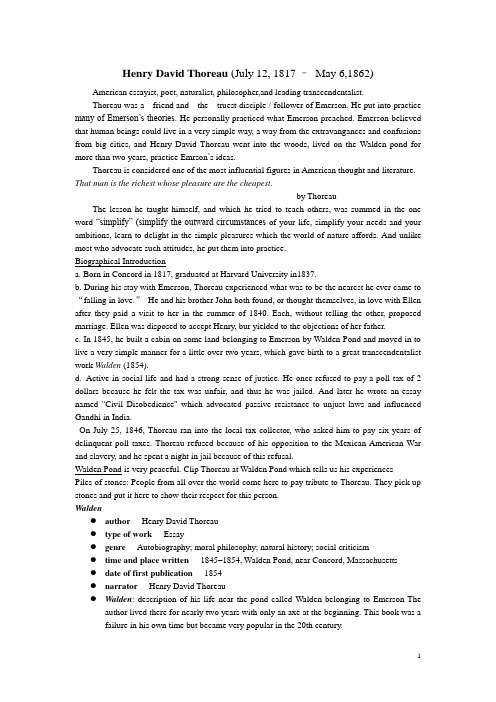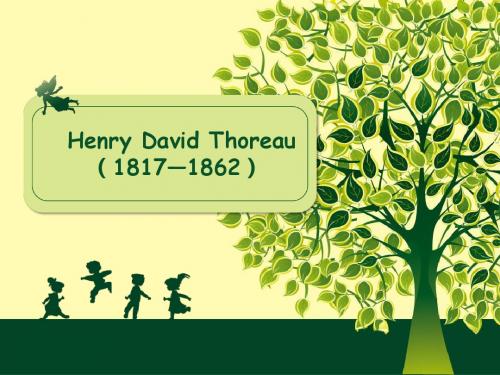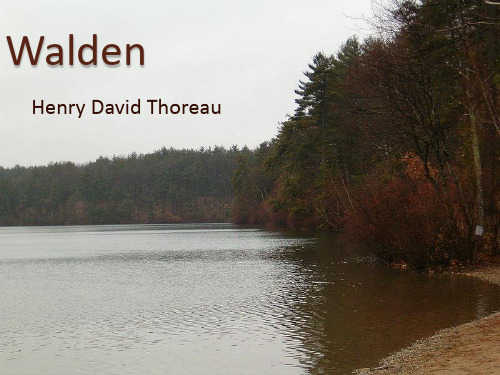Henry David Thoreau——Walde 我制作的精品
- 格式:ppt
- 大小:1.65 MB
- 文档页数:15


Henry David Thoreau (July 12, 1817 –May 6,1862)American essayist, poet, naturalist, philosopher,and leading transcendentalist.Thoreau was a friend and the truest disciple / follower of Emerson. He put into practice many of Emerson’s theories. He personally practiced what Emerson preached. Emerson believed that human beings could live in a very simple way, a way from the extravangances and confusions from big cities, and Henry David Thoreau went into the woods, lived on the Walden pond for more than two years, practice Emrson’s ideas.Thoreau is considered one of the most influential figures in American thought and literature. That man is the richest whose pleasure are the cheapest.----by ThoreauThe lesson he taught himself, and which he tried to teach others, was summed in the one word ―simplify‖ (simplify the outward circumstances of your life, simplify your needs and your ambitions, learn to delight in the simple pleasures which the world of nature affords. And unlike most who advocate such attitudes, he put them into practice.Biographical Introductiona. Born in Concord in 1817, graduated at Harvard University in1837.b. During his stay with Emerson, Thoreau experienced what was to be the nearest he ever came to “falling in love.”He and his brother John both found, or thought themselves, in love with Ellen after they paid a visit to her in the summer of 1840. Each, without telling the other, proposed marriage. Ellen was disposed to accept Henry, bur yielded to the objections of her father.c. In 1845, he built a cabin on some land belonging to Emerson by Walden Pond and moved in to live a very simple manner for a little over two years, which gave birth to a great transcendentalist work Walden (1854).d.Active in social life and had a strong sense of justice. He once refused to pay a poll-tax of 2 dollars because he felt the tax was unfair, and thus he was jailed. And later he wrote an essay named "Civil Disobedience" which advocated passive resistance to unjust laws and influenced Gandhi in India.On July 25, 1846, Thoreau ran into the local tax collector, who asked him to pay six years of delinquent poll taxes. Thoreau refused because of his opposition to the Mexican-American War and slavery, and he spent a night in jail because of this refusal.Walden Pond is very peaceful. Clip Thoreau at Walden Pond which tells us his experiencesPiles of stones: People from all over the world come here to pay tribute to Thoreau. They pick up stones and put it here to show their respect for this person.Walden●author · Henry David Thoreau●type of work · Essay●genre · Autobiography; moral philosophy; natural history; social criticism●time and place written · 1845–1854, Walden Pond, near Concord, Massachusetts●date of first publication · 1854●narrator · Henry David Thoreau●Walden: description of his life near the pond called Walden belonging to Emerson Theauthor lived there for nearly two years with only an axe at the beginning. This book was a failure in his own time but became very popular in the 20th century.●Walden presented Thoreau's unusual interest in nature and showed his individualismwhich inherited from American Puritanism. The book described the author's extremely simple life and regeneration he experienced when he lived near the Walden pond where he put Emerson's Transcendental doctrines into practice in the actual life.●It is a diary of a nature-lover containing essays of a self-reliant character.●He appeals to the primitive instinct that lies close to the heart of every man.●He saw nature as a genuine restorative , healthy influence on man’s spiritual well-being,and regarded it as a symbol of spirit.●Do not hire a man who does your work for money, but him who does it for love of it.●Go confidently in the direction of your dreams!●Live the life you’ve imagined. As you simplify your life, the laws of the universe will besimpler.●If you would convince a man that he does wrong, do right. Men will believe what theysee.●Men are born to succeed, not fail.●Men have become the tools of their tools.Contents (14 parts)● 1. Economy● 2. Where I Lived, and What I Lived For● 3. Reading4. Sounds5. Solitude6. Visitors7. The Bean-Field8. The Village●9. The Ponds10. Baker Farm11. Higher Laws12. Brute Neighbors●13. House-Warming14. Former Inhabitants and Winter Visitors●15. Winter Animals16. The Pond in Winter17. Spring18. ConclusionWalden●It came out of Thoreau’s two-year experiment at Walden Pond. It stresses the importanceof thought over material circumstance. He believed that there was the possibility for and importance of change in one’s spiritual life which is in harmony with nature. Emerson’s best friend.Thoreau’s ideas embodied in his Walden1.He saw nature as a genuine restorative healthy influence on man’s spiritual well-being, andregarded it as a symbol of spirit. He firmly believes that ―nature objects and phenomena are the original symbols or types which express our thoughts and feelings.‖ He was seen lost in contemplation of the world around. 沃尔登中的第一个重要观点是:自然当作是真正的能够帮助人恢复本真的,具有教育意义的,精神的象征。



